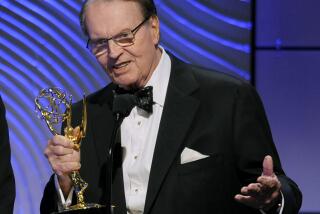Martin Agronsky; Political Talk Show Host
- Share via
WASHINGTON — Martin Agronsky, a legendary broadcast journalist who hosted the pioneering political television talk show “Agronsky & Company” from 1969 to 1986, died of congestive heart failure Sunday at his home in Washington. He was 84.
“Agronsky & Company” was one of the first, best and most successful of that popular form of weekend viewing, the Washington “talking head” program. Agronsky brought sagacious comments and an almost judicial moderation to the proceedings. Over the years, such journalists as Hugh Sidey, George Will, James J. Kilpatrick, Peter Lisagor and Carl Rowan were among the commentators.
During its 18-year run, the half-hour Saturday night program became must viewing for Washington’s political junkies, political figures and much of the public. Sen. Edward M. Kennedy (D-Mass.), once said: “Everybody who is in public life watches Agronsky.”
Over the years, some of the nation’s highest officials let it be known that they watched the program. It was reported that President Ronald Reagan used to phone Will, Sidey and Kilpatrick to comment on the show. President Richard Nixon would send his thoughts on the show to Agronsky via the presidential press secretary.
When Agronsky retired, some thought “Agronsky & Company” had grown stale, but it still had the highest ratings of any Washington news program of its kind.
Agronsky’s broadcast career extended to April 1940, when he signed with NBC as a radio reporter in Europe. He went on to hold major assignments at CBS and ABC and host two news programs for Public Broadcasting Service.
He held a wall full of major awards, including the Heywood Broun Award, as well as Peabody, Emmy, Alfred I. duPont and National Headliner awards. Improbably for a newsman, he also received a Venice Film Festival award, for a documentary he made on an undersea voyage aboard a Polaris submarine.
Martin Zama Agronsky was born Jan. 12, 1915, in Philadelphia. A 1936 graduate of Rutgers University, he worked for the Palestine Post in Jerusalem in 1936 and 1937, then was a freelance newspaper reporter until joining NBC in 1940.
He roamed a world at war for NBC, filing stories from Geneva; Sofia, Bulgaria; Ankara, Turkey; and Belgrade. He also covered the British Eighth Army in North Africa and then went to the Pacific, where he reported from Singapore, Java and Australia.
From 1943 to 1957, he was a Washington correspondent for ABC radio and television. From 1957 to 1964, he worked again for NBC before becoming Paris bureau chief for CBS in 1964. Later that year, he began a four-year tour as moderator of the highly respected CBS Washington reporting program “Face the Nation.”
In 1969, he joined what was then WTOP-TV in Washington as news anchor and became moderator of his Saturday talk show later that year. He hosted “Martin Agronsky’s Evening Edition” on PBS from 1971 to 1974, and in 1975 hosted “Agronsky at Large,” also on PBS.
Agronsky received his George Foster Peabody Award in 1952 for his hard-hitting radio reportage of the scandalous career of Sen. Joseph R. McCarthy ( R-Wis.), who many say trampled the rights of government workers and private citizens in his search for communists.
Edward Bliss Jr., longtime producer of CBS newsman Edward R. Murrow, wrote in his 1992 book, “Now the News: The Story of Broadcast Journalism,” that most people remember Murrow’s 1954 “See It Now” television broadcast as the first real journalistic attack on McCarthy, but that he credited Agronsky, along with radio broadcaster Elmer Davis, with being the first to really expose the senator.
Agronsky received the 1961 Alfred duPont Award for his coverage of what he considered his greatest and most important story: the trial of Nazi war criminal Adolf Eichmann in Jerusalem.
Agronsky once recalled to a Post reporter that “I did the trial from beginning to end, nine months, for NBC.” He said: “I was on the Huntley-Brinkley show every night. NBC was really the only network that had someone there the whole time.
“I think perhaps that was the story I was most drawn into. I always took that story very seriously,” he said.
In fact, he took it so seriously that he nearly broke his health. The constant testimony and evidence of Eichmann’s leadership in operations to murder millions of Jews and others resulted in his coming down with a breathing problem; he simply could not catch his breath. After physicians told him his health was fine and that he simply was reacting to the story, he stayed with the story, covering it from a closed-circuit television until his health recovered.
His Emmy Award in 1968 was for a CBS piece he did about Supreme Court Justice Hugo Black and the Bill of Rights.
His first wife--the former Helen Smathers, whom he married in 1943--died in 1969. His second marriage, to Sharon Agronsky, ended in divorce.
Survivors include four children by his first marriage, Marcia Agronsky of Fort Worth, Jonathan Agronsky of Washington, David Agronsky of Alexandria, Va., and Julie Romansky of Lexington, Mass.; a daughter by his second marriage, Rachel Agronsky of New York; and four grandchildren.
More to Read
Sign up for Essential California
The most important California stories and recommendations in your inbox every morning.
You may occasionally receive promotional content from the Los Angeles Times.













